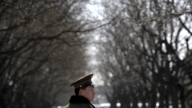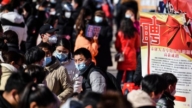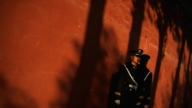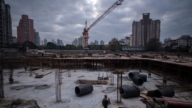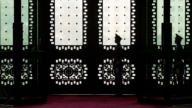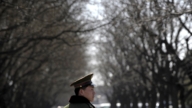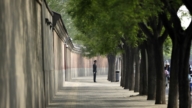【新唐人2013年01月25日訊】中共新總書記習近平上臺後多次強調,中共的腐敗問題不解決勢必將「亡黨」,他在日前的中紀委會議上,矢言要「把權力關進制度的籠子」,要「老虎、蒼蠅一起打」,同時,今年要執行領導幹部報告個人有關事項制度,並開展抽查核實工作等。評論分析:中共當局被迫、被動「改革」,卻是「用貪官反貪官」,所謂的「抽查」工作,可能選擇性的用來攻擊政敵,但民眾還是不知道官員腐敗到甚麼程度。
1月21號和22號,中共第十八屆中紀委召開的第二次全體會議上,研究部署了2013年反腐敗工作。習近平要求,「把權力關進籠子裡」、並且加強反腐敗國家立法、還要對領導幹部個人有關事項進行抽查核實等。
對中共官員的有關信息,為甚麼是進行抽查核實,而不是全部核實?法學和中國問題專家趙遠明分析,中共整肅貪腐的人,本身就有貪腐,所以反腐只能先抽一部分作為試點。
法學和中國問題專家趙遠明:「按習近平的政策『蒼蠅老虎一起打』,那都打完了,它這個政權就完了,因為沒有幹部了,95%的幹部都要關到監獄裏,那你政府怎麼運作?它只好先5%,選擇貪污數量民憤比較大的,在政治上和習李新政唱對臺戲的,或者不聽話的,就先打,然後那些聽話的雖然貪一點,你趕快收斂收斂,它可能就不打或者延遲打。」
政論家伍凡分析,現在中共只是「試探性的反腐」。
政論家伍凡:「他不做也不行,不做現在貪污腐敗太厲害,民怨太大,民間反應太壞,那麼他樣子也要做一點,他這次不是講:大老虎也打,小蒼蠅也打。問題大老虎打的是甚麽老虎?甚麽算大老虎?甚麽算小老虎?這個標準我們不知道。不管怎麼講吧,他現在已經在架子上了,不打也不行了。」
大陸律師唐荊陵指出,這是當局被迫、被動改革的一種體現。民間要求官員財產公開呼聲高漲,當局面對輿論的壓力,提出這個措施,試圖跟上民意的步伐。
大陸律師唐荊陵:「這種所謂抽查式的財產公開,他們的那個財產公開是指向政府內部機構公開,比如說向紀委,或者向中共的黨的機構公開,並不是指的向民眾,實際上,我們所要求的這個公開是指政府官員必須向人民負責,向人民公開他的財產和利益關係狀況。」
唐荊陵還表示,當局這種「應對式的改革」措施,不能夠順應民眾的呼籲,所有「抽查」都可能選擇性的用來攻擊政敵,但民眾還是不知道官員腐敗到甚麼程度。
此外,中紀委會議上還制訂「反腐五年規劃」,同時還強調要不折不扣落實「八項規定」、「以黨章治黨」,做到信仰不變,堅決維護黨章的權威性和嚴肅性,保證黨的集中統一。
唐荊陵指出,「用貪官反貪官」,是中共維護專制體制的秘訣,如果真反腐,它就很難維持下去,現在它強調「以黨章治黨」也是維持專政的手段。
唐荊陵:「專制是通過利益分肥體系來維持它的運轉,通過給一些人提供好處,那麼這些人願意成為它的工具,來統治人民,來奴役人民,所以用貪官反貪官這是專制的必然邏輯。」
伍凡指出,共產黨自己治不了黨
伍凡:「共產黨現在不反腐敗也是死,反腐敗也是死,看看它怎麼死法,如果這麼反腐敗,它不敢把東西公開曝光,要曝光,那反共的更厲害,那麼你現在不曝光,悄悄的來治,那很多人就在你下手之前,人家就逃跑了,有那麼多資金往外跑,你共產黨也是死,總之,用這種辦法是不能解決問題的。」
伍凡指出,中共「以黨章治黨」已經治了幾十年了,越治越貪。他說,這種做法不是為了「解決貪污」,純粹是爲了「挽救共產黨」。
採訪編輯/李韻 後製/王明宇
Chinese Regimes Anti-Corruption Campaign: Announces Spot-Checks of Officials’ Property
After Xi Jinping became the new Secretary General
of the Chinese Communist Party (CCP), he
emphasized several times that the CCP will cease
to exist if the issue of corruption is not solved.
In a recent meeting of the Central Commission for
Discipline Inspection (CCDI), Xi vowed to put “power
within a cage of regulations”, to “fight both tigers and flies”.
He also said this year will see the execution of a rule
that leaders will have to declare personal properties.
They will also launch random spot-checks on officials.
Commentators analyzed that the CCP authorities
were forced to undergo reform, but “use corrupt officials as the target of anti-corruption.”
These so-called “spot-checks” may
be used to attack political opponents.
However, people still won’t know
how corrupt CCP officials are.
On January 21 and 22, the CCP 18th CCDI
organized it’s second plenary meeting.
In it, they discussed the deployment
the anti-corruption actions in 2013.
In this meeting, Xi Jinping asked to place
“power within a cage of regulations”.
He also asked for the strengthening of anti-corruption
legislation, and to spot-check officials’ personal property.
Why did Xi Jinping ask for spot-checks of CCP
officials, but not an overall system to stop corruption?
Zhao Yuanming, an expert on Chinese
law and current affairs, commented.
Zhao analyzed that the CCP official in charge
of purging corruption is himself corrupt.
This is the reason why anti-corruption
will only target a small group.
Zhao Yuanming: “If they follow Xi Jinping’s request to
『fight tigers and flies’, and remove all the corrupt officials,
the regime will be over because there are no clean officials.
95% of current officials will be jailed,
so how could the regime operate?
That’s the reason why they have to fight 5% first.
They will select the corrupt officials who the
Chinese people are most aggrieved with.
They will also select those who politically oppose
the Xi-Li leadership, or don’t follow their commands.
Obedient officials who are also corrupt, will restrain
themselves to try to avoid being targeted now or later.”
Wu Fan, a political commentator analyzed that the
CCP is currently tentatively acting for anti-corruption.
Wu Fan: “He [Xi Jinping] has to do it because corruption
is very serious now, and there are too many grievances.
Civil reaction has been very bad,
which forced him to do something.
He said he will fight the big tigers and small
flies, but the question is which kind of tiger?
Who is a big tiger, and who is a small tiger?
We don’t know the criteria for measuring this.
No matter what he said, he is
on the stage and has to fight.”
Tang Jingling, a lawyer in Mainland China, highlights that
this is a reaction because the regime was forced to reform.
The people began asking louder and louder for
officials to publish information on their properties.
Under this pressure, the authorities launched
this policy, in order to meet public opinion.
Tang Jingling: “This so-called spot-checking of officials’
property, means they will publish this information internally.
This will include the CCDI and other CCP’s organizations.
This information will not be published to the public.
In fact, the publishing we asked for as civilians
is the officials take responsibility for the people.
That they would publish their
property and interests to the people.”
Tang Jingling also said that the “reaction of reform”
by the authorities isn’t to meet the people’s appeal.
All the spot-checks can be used to fight political opponents,
and people will still not know how corrupt the officials are.
In addition, the CCDI made a “five-year anti-corruption plan”
in the meeting, emphasizing implementation of the
“eight regulars” and “rule the party by party constitution.”
All the officials should be consistent in this belief.
They should safeguard the seriousness of the party
constitution, to ensure the party is centralized and unified.
Tang Jingling points out that the “use of corrupt
officials to undertake anti-corruption” is the CCP’s secret to maintain its dictatorship.
If they were to really act to end corruption,
it will be hard for the CCP to survive.
Now it emphasizes “rule the party by party
constitution,” to maintain its dictatorship.
Tang Jingling: “The dictatorship is maintained by
a distribution of interests and benefits within it’s system.
It gives a group of people some benefits, then those people
are likely to be the party’s tools to rule and enslave people.
So it’s an inevitable logic for a dictatorship that
uses corrupt officials to work to end corruption.”
Wu Fan highlights that the CCP is not able to save itself.
Wu Fan: “Now, the CCP will collapse,
regardless of anti-corruption measures.
This is part of the process of its death.
With regards to anti-corruption, it doesn’t dare to really
explore anti-corruption, because this will become anti-CCP.
So it will act secretly against corruption, then many corrupt
officials will flee China before the CCP is able to take action.
Then so much money will leave
China, and the CCP will collapse.
In a few words, anti-corruption is not the solution.”
Wu Fan says that the CCP has ruled for over 60
years, using “rule the party by party constitution”.
However, it has become more and more corrupt.
This shows that this is not a solution to “solve the situation
of corruption”, but it is an attempt to “save the party”.


